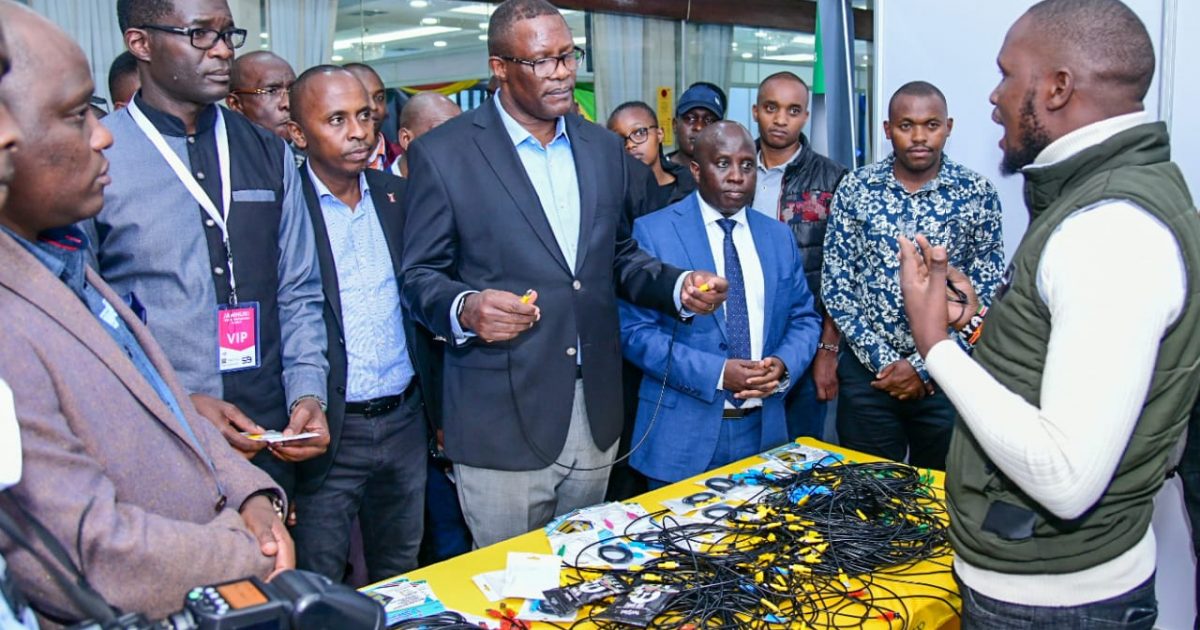The government will deploy a total of 23,000 computer devices to all technical and Vocational Education and Training institutions across the country to enable young Kenyans utilize their technological skills in the local and global digital market.
Cabinet Secretary for Information, Communications and The Digital Economy, Eliud Owalo said the government will also connect the institutions with high speed quality internet to ensure the youth are fully equipped to venture into the digital market.
He at the same time urged investors in the technical education who want to invest in the country to partner with the government for symbiotic gains.
Owalo said the government is looking forward to a Public-Private-Partnerships in the ICT and innovation spaces to address issues within the tech and innovation ecosystem among them training, talent development, placement and creation of digital jobs.
He said the digital technology is redefining economies and societies at an unprecedented pace in the areas of education, communication, innovation, finance, commerce and industry, a technology he noted, the government is keen to be part of in the 21st century technological revolution.
“Our engagement with the revolution will be on big data, robotics, artificial intelligence, e-learning, internet, e-commerce, creative economy and the digital economy among others,” he stated.
Owalo was speaking today during the launch of the Innovation Exhibition at Kenyatta International Convention Centre where various teams among them youths, institutions, governments departments, Corporations and private sector exhibited their innovations.
He said Kenya’s anticipation of a 100 percent of digitalized government services, internet connectivity in every home, e-learning, e-commerce, e-agriculture, e-health and membership to a global wired world community requires a huge tech-talent human resource to manage various networks.
“The human resource will manage infrastructure, networks, and applications and provide innovative solutions for a digitally empowered nation,” said Owalo.
He reiterated President William Ruto and his government’s commitment to invest in development of digital talent for the future, and to have a human resource that will not only serve local needs but also meet international demand.
Owalo announced that the government is investing in the necessary institutions and infrastructure, while creating enabling policy, legal and regulatory frameworks to transform the country into a world-class digital society that will serve as Africa’s digital headquarters.
He said the government intends to digitize at least 5,000 government services and processes over the next six months and the Cabinet, adding that currently a total of 350 government services and processes have been digitized.
“And over the next five years of the Kenya Kwanza government, we purpose to digitize all government records,” he added.
Owalo said the government will work with both local and international partners to expand the national fibre optic network by 100,000 km, adding that the government has already began providing internet hotspots in various markets.
“We expect to provide up to 25,000 hotspots over the next five years. These hotspots are going to convert villages and markets places into digital hubs,” he said.
He added that the various initiatives among them the Hustler Fund and internet connectivity created by the government are aimed at creating jobs and generating wealth particularly, for people living at the lower end the social pyramid.
The CS said the exhibition has shown that the country has talented tech-savvy youth who are part of the country’s national assets, and assured of the government’s commitment to upskill and re-tool their technological skills to globally competitive levels.
In his remarks, the Principal Secretary for ICT and The Digital Economy Eng. John Tanui said the government is putting in place the necessary measures to ensure that Kenyans access affordable digital devices.
The PS said the government will also ensure that sufficient guidelines, regulations and frameworks on how services are carried out are put in place to avoid incidences of cyber risks.
“We will protect the digital spaces, enhance awareness and provide skills capability, as well as ensure that there is compliance in data to avoid cyber risks,” he stated.
By Bernadette Khaduli





